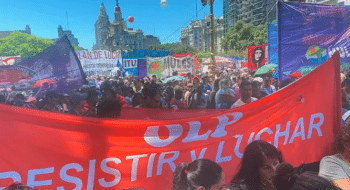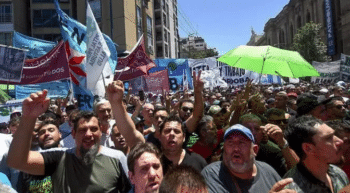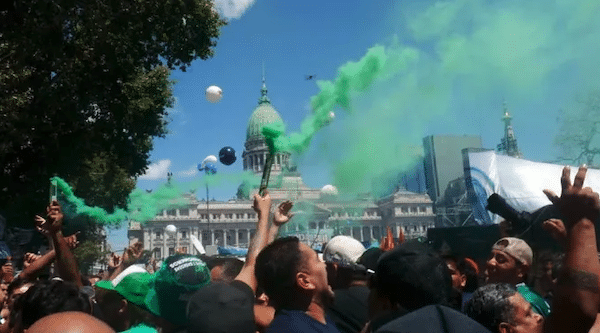 The general strike against the austerity measures and the Omnibus Law was strongly felt throughout the country yesterday. Although the mobilization had its epicenter in the Capital, in the main cities of the interior, there were massive protests as well. According to Tiempo Argentino, over a million and a half people filled the streets of the country.
The general strike against the austerity measures and the Omnibus Law was strongly felt throughout the country yesterday. Although the mobilization had its epicenter in the Capital, in the main cities of the interior, there were massive protests as well. According to Tiempo Argentino, over a million and a half people filled the streets of the country.
There were unprecedented demonstrations, for example, in Mar del Plata and Bariloche, and large mobilizations throughout every province against the austerity measures.
The General Confederation of Labor (CGT) announced that more than one and a half million people had mobilized throughout Argentina to protest against the decree and the Omnibus Law.
 The images that circulated in the networks showed large gatherings in almost all the capitals of Argentina. In the City of Buenos Aires, getting to Congress was an almost impossible task.
The images that circulated in the networks showed large gatherings in almost all the capitals of Argentina. In the City of Buenos Aires, getting to Congress was an almost impossible task.
In Córdoba, a district very favorable to Milei, the march ended in Patio Olmos, and traffic was cut off for several blocks around. As the CGT is divided in La Docta, there was also another congregation in Plaza España.
In La Rioja, the march was also massive, as well as in Mar del Plata, where it is estimated that there were 40 thousand people. The protest ended at the monument to San Martín.
In Jujuy, the demonstration converged at the government house, while in Salta, they congregated at Plaza 9 de Julio.
 In Bariloche, in an unprecedented protest, thousands of people arrived at the Civic Center to express their rejection to Javier Milei’s measures. On the coast, there were images of demonstrators applauding from the beach.
In Bariloche, in an unprecedented protest, thousands of people arrived at the Civic Center to express their rejection to Javier Milei’s measures. On the coast, there were images of demonstrators applauding from the beach.
Plaza Independencia, in San Miguel, was the scene of the main protest in Tucumán. In the city of Santa Fe, there was a demonstration of state employees in front of the Ministry of Education of the province, where they claimed 191 dismissals of workers, and then they went to the Legislature, where the central labor unions were carrying out their central act in the district.
In Santa Cruz, the measure of force was supported by the construction (Uocra), mining and oil, gas, and state unions, which in the afternoon will concentrate in a march to be held in Río Gallegos.
In Neuquén, more than fifty social, union, and student organizations, tenants and cultural associations, cooperatives, and other organizations participated in a massive mobilization against DNU 70/2023 and the “Ley Bases.”
Milei had threatened repercussions from those who protested, but the sheer massive numbers put the balance of forces firmly on the side of those in the streets who opposed his Decree of Necessity and Urgency (DNU) and his austere Omnibus Law. The massive display of opposition comes just 45 days since Milei became president and is just the first round of struggle against his Bolsanaro like model of neoliberalism.
Source: Resumen Latinoamricano—Buenos Aires with contribution from Tiempo Argentino

